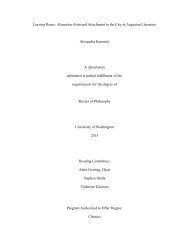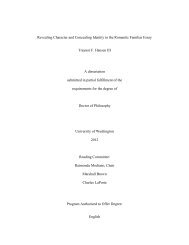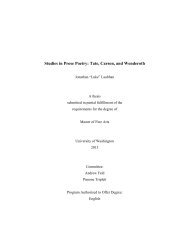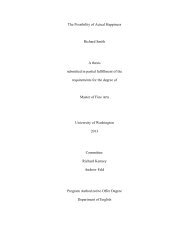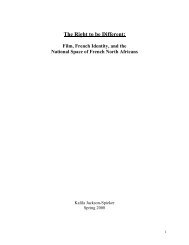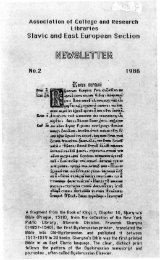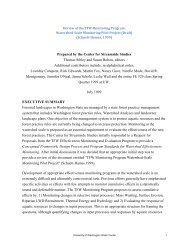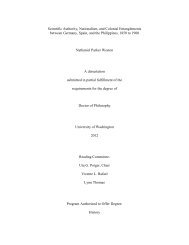- Page 1: c○ Copyright 2011 Katherine Nicho
- Page 5: University of Washington Graduate S
- Page 9: University of Washington Abstract U
- Page 13 and 14: TABLE OF CONTENTS List of Figures .
- Page 15 and 16: 3.1 Overview of Studies . . . . . .
- Page 17 and 18: 2.1 Participant Recruitment . . . .
- Page 19: Appendix B: Literature Search and L
- Page 22 and 23: 11.2 The Information Clips reading
- Page 24 and 25: 11.2 Examples of Calico reading too
- Page 27 and 28: ACKNOWLEDGMENTS This dissertation c
- Page 29: To the chemists Runge, Robiquet, Pe
- Page 33 and 34: CHAPTER 1 INTRODUCTION But when the
- Page 35 and 36: Introduction 3 Still, the very natu
- Page 37 and 38: Introduction 5 Figure 1.1: The PATT
- Page 39 and 40: Introduction 7 Forming the central
- Page 41 and 42: Introduction 9 the complex dynamics
- Page 43: Introduction 11 However, switching
- Page 47 and 48: Reading Disabilities 15 abilities w
- Page 49 and 50: Reading Disabilities 17 hidden/invi
- Page 51 and 52: Reading Disabilities 19 depends on
- Page 53 and 54: Reading Disabilities 21 3.3 Word Se
- Page 55 and 56: Reading Disabilities 23 limited wor
- Page 57 and 58: Reading Disabilities 25 of the popu
- Page 59 and 60: Reading Disabilities 27 low-level e
- Page 61 and 62: Reading Disabilities 29 the general
- Page 63 and 64: Reading Disabilities 31 separate co
- Page 65 and 66: Reading Disabilities 33 as well wit
- Page 67 and 68: Reading Disabilities 35 considered
- Page 69 and 70: Reading Disabilities 37 readers of
- Page 71 and 72: CHAPTER 3 ASSISTIVE TECHNOLOGIES FO
- Page 73 and 74: Assistive Technologies for Reading
- Page 75 and 76: Assistive Technologies for Reading
- Page 77 and 78: Assistive Technologies for Reading
- Page 79 and 80: Assistive Technologies for Reading
- Page 81 and 82: Assistive Technologies for Reading
- Page 83 and 84: Assistive Technologies for Reading
- Page 85 and 86: Assistive Technologies for Reading
- Page 87 and 88: Assistive Technologies for Reading
- Page 89 and 90: Assistive Technologies for Reading
- Page 91 and 92: Assistive Technologies for Reading
- Page 93: Assistive Technologies for Reading
- Page 96 and 97:
64 Chapter 4 varied as medicine, ag
- Page 98 and 99:
66 Chapter 4 the technology may als
- Page 100 and 101:
68 Chapter 4 villagers had difficul
- Page 102 and 103:
70 Chapter 4 Figure 4.3: A possible
- Page 104 and 105:
72 Chapter 4 than other technology
- Page 106 and 107:
74 Chapter 4 2.3 Kintsch and DePaul
- Page 108 and 109:
76 Chapter 4 Table 4.2: Description
- Page 110 and 111:
78 Chapter 4 of the research studie
- Page 112 and 113:
80 Chapter 4 Riemer-Reiss and Wacke
- Page 114 and 115:
82 Chapter 4 Figure 4.5: The PATTC
- Page 116 and 117:
84 Chapter 4 Figure 4.6: Historical
- Page 118 and 119:
86 NOTES TO CHAPTER 4 1 Of course,
- Page 120 and 121:
88 Chapter 5 involved in AT adoptio
- Page 122 and 123:
90 Chapter 5 and mutual understandi
- Page 124 and 125:
92 Chapter 5 simply about what feat
- Page 126 and 127:
94 Chapter 5 as critical to the sta
- Page 128 and 129:
96 Chapter 5 Figure 5.2: Instantiat
- Page 130 and 131:
98 Chapter 5 for understanding diff
- Page 132 and 133:
100 Chapter 6 of direct and indirec
- Page 134 and 135:
102 Chapter 6 benefit would be that
- Page 136 and 137:
104 Chapter 6 2.1.1 Paper Selection
- Page 138 and 139:
106 Chapter 6 Table 6.3: Definition
- Page 140 and 141:
108 Chapter 6 difficulties and prov
- Page 142 and 143:
110 Chapter 6 compared to those wit
- Page 144 and 145:
112 Chapter 6 process among people
- Page 146 and 147:
114 Chapter 6 3.3.2 Fairness of Acc
- Page 148 and 149:
116 Chapter 6 3.4.3 Existence of Di
- Page 150 and 151:
118 Chapter 6 notion of literacy al
- Page 152 and 153:
120 Chapter 6 3.7 Privacy The right
- Page 154 and 155:
122 Chapter 6 is actually typical.
- Page 156 and 157:
124 Chapter 6 growing up with dysle
- Page 158 and 159:
126 Chapter 6 raises suspicions, le
- Page 160 and 161:
128 Chapter 6 Privacy is also in te
- Page 162 and 163:
130 Chapter 6 initial identificatio
- Page 164 and 165:
132 Notes to Chapter 6 example invo
- Page 166 and 167:
134 Chapter 7 1 Study Description I
- Page 168 and 169:
136 Chapter 7 technology usage, and
- Page 170 and 171:
138 Chapter 7 Participant Descripti
- Page 172 and 173:
140 Chapter 7 interface he used to
- Page 174 and 175:
142 Chapter 7 screen readers work s
- Page 176 and 177:
144 Chapter 7 deviations from what
- Page 178 and 179:
146 Chapter 7 however, is partially
- Page 180 and 181:
148 Chapter 7 Ross added that askin
- Page 182 and 183:
150 Chapter 7 documentary refuted n
- Page 184 and 185:
152 Chapter 7 a 1W light bulb. Nevi
- Page 186 and 187:
154 Chapter 7 The notion of access
- Page 188 and 189:
156 Notes to Chapter 7 deserve some
- Page 190 and 191:
158 Chapter 8 observationally as in
- Page 192 and 193:
160 Chapter 8 Table 8.1: Semi-struc
- Page 194 and 195:
162 Chapter 8 for “normalcy/ideal
- Page 196 and 197:
164 Chapter 8 3.1 Biographical Sket
- Page 198 and 199:
166 Chapter 8 been able to finish h
- Page 200 and 201:
168 Chapter 8 RD/LD. Otherwise, she
- Page 202 and 203:
170 Chapter 8 The artificiality of
- Page 204 and 205:
172 Chapter 8 would openly mock the
- Page 206 and 207:
174 Chapter 8 to which they belong.
- Page 208 and 209:
176 Chapter 8 (2010) about the fair
- Page 210 and 211:
178 Notes to Chapter 8 NOTES TO CHA
- Page 212 and 213:
180 Chapter 9 Table 9.1: Definition
- Page 214 and 215:
182 Chapter 9 choice is provided to
- Page 216 and 217:
184 Chapter 9 3.2.2 ReadPlease Read
- Page 218 and 219:
186 Chapter 9 words are scanned. Be
- Page 220 and 221:
188 Chapter 9 technologies. Texts p
- Page 222 and 223:
190 Chapter 9 additional computing
- Page 224 and 225:
192 Chapter 9 makes their usage ach
- Page 227 and 228:
CHAPTER 10 TECHNICAL INVESTIGATION:
- Page 229 and 230:
Technical Investigation: Design Rec
- Page 231 and 232:
Technical Investigation: Design Rec
- Page 233:
Technical Investigation: Design Rec
- Page 236 and 237:
204 Chapter 11 “stigmatizing” d
- Page 238 and 239:
206 Chapter 11 knowledge, support,
- Page 240 and 241:
208 Chapter 11 Figure 11.1: The sys
- Page 242 and 243:
210 Chapter 11 3.2.1 Examples of To
- Page 244 and 245:
212 Chapter 11 the by-example data
- Page 246 and 247:
214 Chapter 11 but differ in the vi
- Page 248 and 249:
216 Chapter 11 tool provides sugges
- Page 250 and 251:
218 Chapter 11 information in the t
- Page 252 and 253:
220 Chapter 11 design contract that
- Page 254 and 255:
222 Notes to Chapter 11 NOTES TO CH
- Page 256 and 257:
224 Chapter 12 Table 12.1: Replicat
- Page 258 and 259:
226 Chapter 12 of the three selecte
- Page 260 and 261:
228 Chapter 12 policies, and other
- Page 262 and 263:
230 Chapter 12 disabilities. Projec
- Page 264 and 265:
232 Chapter 12 I eventually came to
- Page 266 and 267:
234 Bibliography Baker, B. R. (1986
- Page 268 and 269:
236 Bibliography in design. In CHI
- Page 270 and 271:
238 Bibliography design. In Proceed
- Page 272 and 273:
240 Bibliography http://www.irextec
- Page 274 and 275:
242 Bibliography York: ACM. Lewis,
- Page 276 and 277:
244 Bibliography Nook eBook reader
- Page 278 and 279:
246 Bibliography on an internationa
- Page 280 and 281:
248 Bibliography ∗ Spekman, N. J.
- Page 282 and 283:
250 Bibliography WFD: World federat
- Page 285 and 286:
APPENDIX A AT RECOMMENDATIONS FROM
- Page 287:
Table A.2: AT recommendations by we
- Page 290 and 291:
258 Appendix B • Learning Disabil
- Page 292 and 293:
260 Appendix B • Possible Applica
- Page 294 and 295:
262 Appendix B Table B.2 lists the
- Page 296 and 297:
264 Appendix B DOI: 1456536.1456540
- Page 298 and 299:
266 Appendix B K. Deibel (2007). Ad
- Page 300 and 301:
268 Appendix B K. Fraser, T. Rodden
- Page 302 and 303:
270 Appendix B A. I. Karshmer, G. G
- Page 304 and 305:
272 Appendix B M. Back and M. H. Sz
- Page 307 and 308:
APPENDIX C ENHANCED BAKER’S BASIC
- Page 309 and 310:
Enhanced Baker’s Basic Ergonomic
- Page 311 and 312:
APPENDIX D VALUE-ANNOTATED BIBLIOGR
- Page 313 and 314:
Value-Annotated Bibliography 281 Qu
- Page 315 and 316:
Value-Annotated Bibliography 283 Su
- Page 317 and 318:
Value-Annotated Bibliography 285 Th
- Page 319 and 320:
Value-Annotated Bibliography 287 Pr
- Page 321 and 322:
Value-Annotated Bibliography 289 Th
- Page 323 and 324:
Value-Annotated Bibliography 291 Mo
- Page 325 and 326:
Value-Annotated Bibliography 293 So
- Page 327 and 328:
Value-Annotated Bibliography 295 Si
- Page 329 and 330:
Value-Annotated Bibliography 297 In
- Page 331:
Value-Annotated Bibliography 299 Ar



